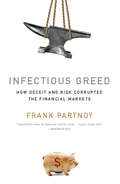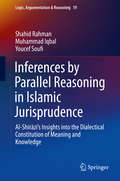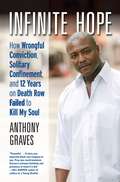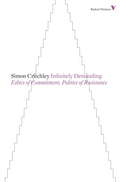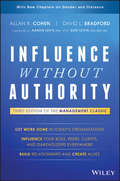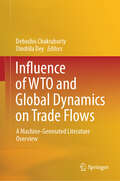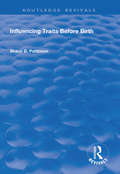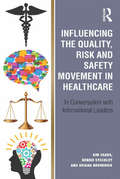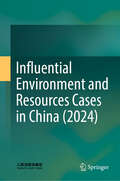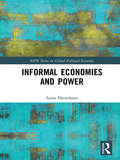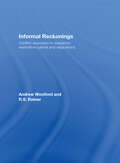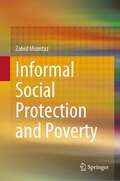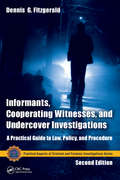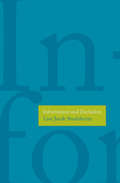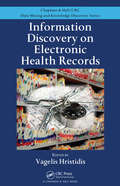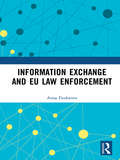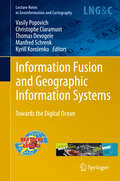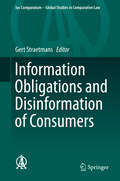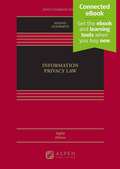- Table View
- List View
Infamy (A Butch Karp-Marlene Ciampi Thriller #28)
by Robert K. TanenbaumThe “rock-solid” (Kirkus Reviews) prosecutor Butch Karp and his wife, Marlene Ciampi, return to solve the suspicious murder of a US colonel and battle corruption at the highest levels of the United States government in this novel by New York Times bestselling author Robert K. Tanenbaum.Intrigue, murder, corruption, and dramatic courtroom battles combine to make Infamy another must-read in Robert K. Tanenbaum’s “tightly-written” (Booklist) legal thrillers. When a former Army veteran suddenly murders a colonel in New York, he claims that he had to do it because he was being used in mind control experiments. Surprisingly, a top Wall Street criminal defense lawyer, one with ties to the White House, decides to defend the killer, arguing that his client suffered from post-traumatic stress from his tours in Afghanistan and that it’s his patriotic duty to assist him. As New York District Attorney Roger “Butch” Karp prepares a murder case against the veteran, he meets with investigative reporter Ariadne Stupenagel, who suspects that one of her sources for a story on high-level government corruption was a victim in the shooting. In this fast-paced thriller, Karp goes up against corruption so powerful that he, his family, and his friends are in danger if he intends to prosecute those responsible.
Infectious Diseases in the New Millennium: Legal and Ethical Challenges (International Library of Ethics, Law, and the New Medicine #82)
by Iain Brassington Mark Eccleston-TurnerThis book examines the often tough questions raised by infectious diseases through essays that explore a host of legal and ethical issues. The authors also offer potential solutions in order to ensure that past errors are not repeated in response to future outbreaks. The essays touch on a number of key themes, including institutional competence, the accountability and responsibility of non-state actors, the importance of pharmaceuticals, and the move towards a rights-based approach in global health.Readers gain insights into such important questions as follows: How can we help victims in other countries? What (if any) responsibility should be placed upon international organizations whose actions exacerbate infectious diseases? How can we ensure that pharmaceutical research helps all communities, even those who cannot afford to pay for the products? While broadly covering global health law, the book adopts an inter-disciplinary approach that draws on public international law, philosophy, international relations, human rights law, and healthcare economics. As such, it is a valuable resource for academic libraries, appealing to scholars and postgraduates engaged in relevant research, as well as to those engaged with global health and policy at the international level.
Infectious Greed: How Deceit and Risk Corrupted the Financial Markets
by Frank PartnoyAs the global financial crisis unfolds people everywhere are seeking to understand how markets devolved to this perilous, volatile state. In this dazzling and meticulously researched work of financial history, first published in 2003, and now thoroughly revised and updated, law professor and financial expert Frank Partnoy tells the story of how "classical" Wall Street securities like stocks and bonds were quietly eclipsed by ever more "quantum" products like derivatives. He documents how, starting in the mid-1980s, each new level of financial risk and complexity obscured the sickness of corporate America, and how Wall Street's evlving paradigm moved farther and farther beyond the understanding-and regulation-of ordinary investors and government overseers, leading inevitably to disaster.
Inferences by Parallel Reasoning in Islamic Jurisprudence: Al-Shīrāzī’s Insights into the Dialectical Constitution of Meaning and Knowledge (Logic, Argumentation & Reasoning #19)
by Shahid Rahman Muhammad Iqbal Youcef SoufiThis monograph proposes a new (dialogical) way of studying the different forms of correlational inference, known in the Islamic jurisprudence as qiyās. According to the authors’ view, qiyās represents an innovative and sophisticated form of dialectical reasoning that not only provides new epistemological insights into legal argumentation in general (including legal reasoning in Common and Civil Law) but also furnishes a fine-grained pattern for parallel reasoning which can be deployed in a wide range of problem-solving contexts and does not seem to reduce to the standard forms of analogical reasoning studied in contemporary philosophy of science and argumentation theory. After an overview of the emergence of qiyās and of the work of al-Shīrāzī penned by Soufi Youcef, the authors discuss al-Shīrāzī’s classification of correlational inferences of the occasioning factor (qiyās al-'illa). The second part of the volume deliberates on the system of correlational inferences by indication and resemblance (qiyās al-dalāla, qiyās al-shabah). The third part develops the main theoretical background of the authors’ work, namely, the dialogical approach to Martin-Löf's Constructive Type Theory. The authors present this in a general form and independently of adaptations deployed in parts I and II. Part III also includes an appendix on the relevant notions of Constructive Type Theory, which has been extracted from an overview written by Ansten Klev. The book concludes with some brief remarks on contemporary approaches to analogy in Common and Civil Law and also to parallel reasoning in general.
Inferno: An Anatomy of American Punishment
by Robert A. FergusonAn Open Letters Monthly Best Nonfiction Book of the YearAmerica’s criminal justice system is broken. The United States punishes at a higher per capita rate than any other country in the world. In the last twenty years, incarceration rates have risen 500 percent. Sentences are harsh, prisons are overcrowded, life inside is dangerous, and rehabilitation programs are ineffective. Looking not only to court records but to works of philosophy, history, and literature for illumination, Robert Ferguson, a distinguished law professor, diagnoses all parts of a now massive, out-of-control punishment regime.“If I had won the $400 million Powerball lottery last week I swear I would have ordered a copy for every member of Congress, every judge in America, every prosecutor, and every state prison official and lawmaker who controls the life of even one of the millions of inmates who exist today, many in inhumane and deplorable conditions, in our nation’s prisons.”—Andrew Cohen, The Atlantic“Inferno is a passionate, wide-ranging effort to understand and challenge…our heavy reliance on imprisonment. It is an important book, especially for those (like me) who are inclined towards avoidance and tragic complacency…[Ferguson’s] book is too balanced and thoughtful to be disregarded.”—Robert F. Nagel, Weekly Standard
Infiltrado: Operación Julie - el interior de la historia
by Stephen BentleyContado de forma magistral por el oficial disfrazado Stephen Bentley, éste ya no es un libro sensacionalista sobre un crimen verdadero. Sumérjase más allá de las partes visibles del agua y llegue a las profundidades sombrías, a medida que usted será conducido no sólo por la operación, sino por las consecuencias, tanto personales como públicas. Una lectura obligatoria para los verdaderos amantes del crimen e historiadores. No soy capaz de recomendar este libro lo suficiente. Fue una lectura muy agradable. - Resumen La Operación Julie sigue siendo hoy el punto de referencia para todas las operaciones de agentes infiltrados británicos y en los más diversos entrenamientos. En 2011, la BBC afirmó que esa operación policial sólida y única fue el inicio de la guerra contra las drogas. Stephen Bentley fue uno de los cuatro detectives infiltrados involucrados en la Operación Julie, una de las mayores aprehensiones de drogas del mundo. Junto con su socio disfrazado, tuvieron acceso a una banda que producía cerca del 90% del LSD del mundo y descubrió un plan para importar enormes cantidades de cocaína boliviana al Reino Unido. El submundo conoció al autor como Steve Jackson. ¿Cómo logró infiltrarse en las dos pandillas? ¿Cómo convertirse en un usuario de drogas y "vivir una mentira" le afectó? Descubre las respuestas entrando en la mente de Steve Jackson, detective disfrazado. "La perspectiva de un insider sobre el tráfico de drogas, contada con encanto, inteligencia y, a veces, humor, por un hombre talentoso, calificado de forma única para contar la verdadera historia." - Resumen de la Crítica "Este no es un drama criminal de televisión donde los chicos y los bandidos son fácilmente identificables y donde el crimen se resuelve durante una hora en que el programa está en el aire. En la historia de la vida real de la Operación Julie, las líneas definidoras no son tan claras y me quedé bastante intrigado
Infinite Hope: How Wrongful Conviction, Solitary Confinement, and 12 Years on Death Row Failedto Kill My Soul
by Anthony GravesWritten by a wrongfully convicted man who spent 16 years in solitary confinement and 12 years on death row, a powerful memoir about fighting for--and winning--exoneration.In the summer of 1992, a grandmother, a teenage girl, and four children under the age of ten were beaten and stabbed to death in Somerville, Texas. The perpetrator set the house on fire to cover his tracks, deepening the heinousness of the crime and rocking the tiny community to its core. Authorities were eager to make an arrest. Five days later, Anthony Graves was in custody.Graves, then twenty-six years old and without an attorney, was certain that his innocence was obvious. He did not know the victims, he had no knowledge about the crime, and he had an airtight alibi with witnesses. There was also no physical evidence linking him to the scene. Yet Graves was indicted, convicted of capital murder, sentenced to death, and, over the course of twelve years on death row, given two execution dates. He was not freed for eighteen years, two months, four days.Through years of suffering the whims of rogue prosecutors, vote-hungry district attorneys, and Texas State Rangers who played by their own rules, Graves was frequently exposed to the dire realities of being poor and black in the criminal justice system. He witnessed fellow inmates who became his friends and confidants be taken away, one by one, to their deaths. And he missed out on seeing his three young sons mature into men. Graves's only solace was his infinite hope that the state would not execute him for a crime he did not commit. To maintain his dignity and sanity, Graves made sure as many people as possible knew about his case. He wrote letters to whomever he thought would listen. Pen pals in countries all over the world became allies, and he attracted the attention of a savvy legal team that overcame setback after setback, chiseling away at the state's faulty case against him. Everyone's efforts eventually worked. After Graves's exoneration, the original prosecutor on his case was disbarred.Graves is one of a growing number of innocent people exonerated from death row. The moving account of his saga--of his ultimate fight for freedom from inside a prison cell--is as haunting as it is poignant, and as shameful to the legal system as it is inspiring to those on the losing end of it.
Infinitely Demanding
by Simon CritchleyThe clearest, boldest and most systematic statement of Simon Critchley's influential views on philosophy, ethics, and politics, Infinitely Demanding identifies a massive political disappointment at the heart of liberal democracy. Arguing that what is called for is an ethics of commitment that can inform a radical politics, Critchley considers the possibility of political subjectivity and action after Marx and Marxism, taking in the work of Kant, Levinas, Badiou and Lacan. Infinitely Demanding culminates in an argument for anarchism as an ethical practice and a remotivating means of political organization.From the Trade Paperback edition.
Influence Without Authority
by Allan R. Cohen David L. BradfordGet what you need to achieve your objectives and produce results Influence Without Authority is the classic guide to getting what you need from people you don't control. Getting things done requires collaboration, and convincing others to contribute requires political skill; this book introduces the Exchange Model, in which you get what you need by offering something of value in return. The key lies in knowing what the other person values—that's their "currency," and it's your immediate tool for coaxing their cooperation. This model has been proven over decades, as organizations around the world have turned away from frustration and resignation toward collaboration and results. This book shows you how to implement the Exchange Model at the personal, team, and organizational level to raise the bar for performance and leadership. This new third edition has been updated reflect the changing face of the workplace, and includes new examples and information on geographically dispersed virtual teams. Supplementary materials facilitate classroom and training use with discussions, role-play, videos, and other ancillaries that deepen understanding and promote practical application. Get what you need from the people who have it through mutual exchange Think in terms of interest, and pinpoint the "currencies" other people trade in Apply the Exchange Model across entire organizations to lead major change Learn practical real-world strategies for influencing those you do not control The ability to influence those not under your authority is becoming ever more valuable. Organizations are flattening, and outside contractors are taking on larger roles than ever before—getting results now means lateral cooperation, often across borders, time zones, organizations, and more. Influence Without Authority provides a proven model for success in this new environment, with expert guidance for real-world application.
Influence of WTO and Global Dynamics on Trade Flows: A Machine-Generated Literature Overview
by Debashis Chakraborty Oindrila DeyThis book is a machine-generated literature overview that explores the impact of the World Trade Organization (WTO) on international trade and its development. It looks at international trade before and after 1995 when WTO was established. It highlights the journey of the reciprocity-based reforms under WTO that were expected to help the developing and less developed countries (LDCs) more vis-à-vis their developed counterparts, given the existence of systemic and structural bottlenecks in the latter territories. The enabling steps were further expected to promote exports from developing countries and LDCs in line with their comparative advantage patterns, enhance the wage level and in turn, facilitate development of local population. The book showcases how during the first decade after WTO inception, a considerable progress was made for facilitating exports from the lower and lower-middle income countries through crucial provisions like less than full reciprocity (LTFR), Generalized System of Preferences (GSP), support measures under Aid for Trade, zero duty preferences under Special and Differential Treatment (SDT) and so on. However, the pace of WTO reforms has slowed down in the aftermath of the sub-prime crisis in 2008-09 and subsequent focus on formation of regional trade agreements (RTAs). In particular, in the aftermath of Covid-19, a trend towards de-globalization has been noticed, with considerable ramifications for the development of lower-income countries. In this background, there is a need to analyze how the deepening of trade flows and the subsequent de-globalization waves in the global canvas have traversed different paths in different continents and draw the appropriate lessons for the understanding the trade-development interlinkage therein. With insightful observations from the human editors, this machine-generated overview would be of interest to academicians, policy research community, advisory research community, and students ofinternational trade globally.^
Influencing Traits Before Birth (Routledge Revivals)
by Shaun D. PattinsonThis title was first published in 2002.In this informative and captivating book the author presents a moral critique of the laws governing the creation of designer babies. Alan Gewirth’s Principle of Generic Consistency is used as the starting point for developing a framework, which is then used to critique the legal position in the EU countries (with particular reference to the UK), Canada and the USA. The conclusion the author reaches is that a proper moral response to the issues covered must take account of specified prima facie presumptions, to be applied by legitimately appointed regulatory bodies. The text assesses the adequacy of existing regulatory responses by reference to these presumptions. Also containing detailed appendices summarizing the legal position with regard to abortion and prenatal diagnosis, preimplantation genetic diagnosis, in vitro embryo research, cloning, and germ-line gene therapy in the countries mentioned above, this volume is an indispensable resource for both students and scholars with a keen interest in this highly contested field.
Influencing the Quality, Risk and Safety Movement in Healthcare: In Conversation with International Leaders
by Kim Sears Denise StockleyInfluencing the Quality, Risk and Safety Movement in Healthcare explores the inner workings of some of the most influential minds in healthcare quality, risk and safety. The book was created in cooperation with the Master of Science in Healthcare Quality graduate program, developed and delivered by Queen’s University, Canada. This is the only standalone interdisciplinary Master of Science graduate degree in Healthcare Quality in North America that focuses on creating tomorrow’s healthcare leaders. Following a one-to-one collaboration between each leader in healthcare with a dedicated learner of the MSc(HQ), readers are presented with a synopsis of the leader’s work followed by an in-depth interview with him or her. Interviews center around the leaders’ contributions to and thoughts on quality, risk and safety in healthcare, dealing with topics such as the development of their body of work, their greatest achievements, what they wish they could change, and future direction of quality, risk and safety, etc. The book provides a unique and highly accessible view into how and why the science of healthcare quality has developed, as well as giving a first-hand account of the founders and key players in the movement. It will offer valuable insights to any undergraduate/graduate class with an interest in healthcare, as well as professionals working within any of the many disciplines that can influence the healthcare system.
Influential Environment and Resources Cases in China (2024)
by The Supreme People's Court of the PRCThis book covers the role of justice in global environmental governance, principles of environmental justice, judicial protection of biodiversity, judicial response to climate change, including criminal, civil, administrative, public interest litigation, ecological and environmental damages litigation and other types of environmental resources litigation. With rich content, strong typical significance, great influence and complete system, this book is of great significance for improving international environmental legal rules and continuously deepening environmental legal exchanges and cooperation with countries and international organizations around the world.
Informal Economies and Power: Rethinking Informality, Resilience And Violence In Kosovo (RIPE Series in Global Political Economy)
by Anna DanielssonThe global ubiquity of informal economic activities has turned informality into a key policy question, not least in international peace- and state-building. This book explores a core aspect of economic informality: its resilience despite comprehensive international anti-informality operations. Using Kosovo as an illustrative case, Danielsson suggests that to understand the resilience of informality, two distinct areas of practice need to be studied in conjunction rather than separately. The first concerns the professional practices enacted by international organisations in their attempts to formalise the informal economy in Kosovo. The second area of practice concerns the everyday informal economic practices of social agents in Kosovo. To study these areas of practice at their junction, Danielsson uses Pierre Bourdieu’s concept of symbolic power and argues that in post-conflict Kosovo, the distinct practices have become interwoven and co-constitutive of a novel ordering and meaning of informality. The resilience of the informal thus plays out through – while undermining and reinforcing the need of – the international anti-informality operations. Including scholarship from global governance, global political economy and social theory, this book’s original perspective on informal economies and power will appeal to scholars and professionals located in peace studies, development studies, and the field of international relations.
Informal Funds Transfer Systems
by Samuel Munzele Maimbo Mohammed El Qorchi John F. WilsonA report from the International Monetary Fund.
Informal Reckonings: Conflict Resolution in Mediation, Restorative Justice, and Reparations
by Andrew Woolford R.S. RatnerThe 'reparational turn' in the field of law has resulted in the increased use of so-called 'informal' approaches to conflict resolution, including primarily the three mechanisms considered in this book: mediation, restorative justice and reparations. While proponents of these mechanisms have acclaimed their communicative and democratic promise, critics have charged that mediation, restorative justice and reparations all potentially serve as means for encouraging citizens to internalize and mimic the rationalities of governance. Indeed, the critics suggest that informal justice's supposed oppositional relationship to formal justice is, at base, a mutually reinforcing one, in which each system relies on the other for its effective operation, rather than the two being locked in a struggle for dominance. This book contributes to the discussion of the confluence of informal and formal justice by providing a clearer picture of the justice 'field' through the notion of the 'informal/formal justice complex.' This term, adapted from Garland and Sparks (2000), describes a cultural formation in which adversarial/punitive and conciliatory/restorative justice forms coexist in relative harmony despite their apparent contradictions. Situating this complex within the context of neoliberalism, this book identifies the points of rupture in the informal/formal justice complex to pinpoint how and where a truly alternative and 'transformative' justice (i.e. a justice that challenges and counters the hegemony of formal legal practices, opening the field of law to a broader array of actors and ideas) might be established through the tools of mediation, restorative justice and reparations.
Informal Social Protection and Poverty
by Zahid MumtazThis book analyzes the importance of informal social protection provided by religious institutions such as madrassas in a low-income country such as Pakistan. This book explains that Madrassas are religious schools that have existed in many Muslim countries for centuries and contributed significantly to preserving, forming, and extending human knowledge in medieval times. Further, madrassas are now more commonly viewed as the providers of a narrow education, supporting religious fundamentalism, that may lead to terrorism. However, this book asserts that education is not the only function performed by madrassas. They are a significant source of welfare support for the vulnerable and marginalized households in many low-income countries. This book helps the readers to understand the concept of informal social protection not conceptualized previously. In addition, its various attributes and institutions providing such a form of welfare worldwide are explained in detail; analyzing the usefulness of such a form of social protection would benefit readers of social policy, national governments, and international donor/aid agencies. This book also provides a prescriptive framework for integrating formal and informal social protection. This book provides a new "Multiple Regime Framework", for identifying various regimes in one country at one point in time by applying a novel data collection and analysis methodology. The application of this framework would be of particular interest to social policy scholars, national governments, and donor/aid agencies because it will result in better targeting of social protection policies in the wake of fiscal constraints. Lastly, this book provides a novel data collection and analysis strategy that will benefit the reader of research methodology, development consultants, donor agencies, and policy practitioners interested in using artificial intelligence to make informed and targeted policy decisions.
Informants, Cooperating Witnesses, and Undercover Investigations: A Practical Guide to Law, Policy, and Procedure, Second Edition (ISSN)
by Simon Coffey Dennis G. FitzgeraldThis book covers every aspect of the informant and cooperating witness dynamic a controversial technique shrouded in secrecy and widely misunderstood. Quoted routinely in countless newspaper and magazine articles, the first edition was the go-to guide for practical, effective guidance on this tricky yet powerful tactic. Extensively updated, topics in this second edition include changes in the FBI's informant program, changes brought on by immigration reforms, recent high-profile cases, and the changing nature of compensation and cooperation fees. It also examines the management of informant-driven search warrants and challenges posed by fabricated information.
Information Agglomeration of Japanese Auto Parts Suppliers
by Yosuke Takeda Ichihiro UchidaThis book explains information agglomeration, a new concept we devise under the influence of Hidalgo (2015). Our concept of information agglomeration applies to an economy with horizontal divisions, while an ordinary concept of industry agglomeration means spillover effects of corporate firms on another ones in vertically integrated industries. In a horizontally divided economy of ‘a society in which the capacities of individuals greatly surpass their individual knowledge’ as Hidalgo (2015) envisages, ‘the combinatorial creativity emerges from our species’ ability to crystallize imagination.” Consequently, it is likely that information agglomerates in such knowledge-oriented economies. We take the Japanese auto parts suppliers for example. The production system in which highly modularized products are crafted by skilled labors and multipurpose machines was called flexible specialization instead of mass production by Piore and Sabel (1984). However, the conventional economics of transaction costs pioneered by Ronald Coase and Oliver Williamson suggests that it is costly for dispersed organizational networks to make and sustain creational links to accumulate vast volumes of knowledge/ information. We wonder what has made information agglomeration possible for the Japanese auto parts suppliers with the flexible specialization. What has lowered the transaction costs associated with the organizational links? We consider what causes the information agglomeration to amplify in the supply chains, constructing economic models of some hypotheses on the driving forces of information agglomeration and utilizing firm-level and establish-level micro data to empirically test these hypotheses. Finally, based on the empirical evidence on information agglomeration, we shed light on whither fast-evolving automobile manufacturing in Japan that autonomous driving technology is likely to exert traction on.
Information And Exclusion
by Lior Jacob StrahilevitzNearly all communities are exclusive in some way. When race or wealth is the basis of exclusion, the homogeneity of a neighborhood, workplace, or congregation is controversial. In other instances, as with an artist's colony or a French language book club, exclusivity is tolerable or even laudable. In this engaging book, Lior Strahilevitz introduces a new theory for understanding how exclusivity is created and maintained in residential, workplace, and social settings, one that emphasizes information's role in facilitating exclusion. The book provides many colorful examples to show how lawmakers frequently misunderstand the subtle mechanics of exclusion, leaving enormous loopholes in the law. Strahilevitz focuses particular attention on today's changing dynamics of exclusion and discusses how technology presents new opportunities for governments to stamp out the most offensive exclusionary behaviors.
Information Discovery on Electronic Health Records (Chapman & Hall/CRC Data Mining and Knowledge Discovery Series)
by Vagelis HristidisExploiting the rich information found in electronic health records (EHRs) can facilitate better medical research and improve the quality of medical practice. Until now, a trivial amount of research has been published on the challenges of leveraging this information. Addressing these challenges, Information Discovery on Electronic Health Records exp
Information Exchange and EU Law Enforcement
by Anna FiodorovaPresenting an integrated approach to information exchange among law enforcement institutions within the EU, this book addresses the dilemma surrounding the need to balance the security of individuals and the need to protect their privacy and data. Providing the reader with a comprehensive analysis of information exchange tools, exploring their history, political background, the most recent legal modifications and the advantages and disadvantages of their use, it includes a comparison between different information exchange tools. Written by an author who has worked as a police officer, Home Affairs counsellor and academic, this is an important read for scholars working with EU Law, Criminal Procedure Law, and International Law as well as for practitioners who directly deal with international police cooperation or who perform criminal investigation both within and outside the EU.
Information Fusion and Geographic Information Systems
by Christophe Claramunt Manfred Schrenk Kyrill Korolenko Thomas Devogele Vasily V. PopovichThe Workshop Proceedings reflect problems of advanced geo-information science as far as they are specifically concerned with the maritime environment at large. The Proceedings incorporate papers presented by leading scientists researching in the considered professional area and by practitioners engaged in GIS and GIS applications development. They pay close attention to the problems of scientific and technological innovations and the ensuing opportunities to make seas safer and cleaner. Furthermore, they periodically measure the ground covered and new challenges with respect to economic and shipping trends as related to Artificial Intelligence; GIS ontologies; GIS data integration and modelling; Underwater acoustics; GIS data fusion; GIS and corporate information systems; GIS and real-time monitoring systems; GIS algorithms and computational issues; Novel and emerging marine GIS research areas; Monitoring of maritime terrorist threat; Maritime and environmental GIS; Navigation-based and maritime transportation GIS; Human factors in maritime GIS; Coastal and environmental GIS.
Information Obligations and Disinformation of Consumers (Ius Comparatum - Global Studies in Comparative Law #33)
by Gert StraetmansThis book focuses on recent developments in consumer law, specifically addressing mandatory disclosures and the topical problem of information overload. It provides a comparative analysis based on national reports from countries with common law and civil law traditions in Asia, America and Europe, and presents the reports in the form of chapters that have been drafted on the basis of a questionnaire, and which use the same structure as the questionnaire to allow them to be easily compared. The book starts with an analysis of the basic assumptions underlying the current consumer protection models and examines whether and how consumer models adapt to the new market conditions. The second part addresses the information obligations themselves, first highlighting the differences in the reported countries before narrowing the analysis down to countries with a general pre-contractual information duty, particularly the transparency requirements that often come with such a duty. The next part examines recent developments in the law on food labelling, commercial practices and unfair contract terms in order to identify whether similar traits can be found in European and non-European jurisdictions. The fourth part of the book focuses on specific information obligations in the financial services and e-commerce sectors, discussing the fact that legislators are experimenting with different forms of summary disclosures in these sectors. The final part provides a critical appraisal of the recent developments in consumer information obligations, addressing the question of whether the multiple criticisms from behavioural sciences necessitate abandonment or refinement of current consumer information models in favour of new, more adequate forms of consumer protection, and providing suggestions.
Information Privacy Law
by Daniel J. Solove Paul M. SchwartzA clear, comprehensive, and cutting-edge introduction to the field of information privacy law, with the latest cases and materials exploring issues of emerging technology, information privacy, algorithmic decisions, AI, data security, and European data protection law.


